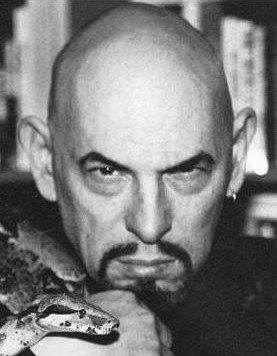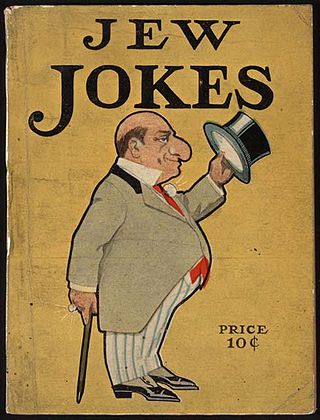
In Greek mythology, Cerberus, often referred to as the hound of Hades, is a multi-headed dog that guards the gates of the Underworld to prevent the dead from leaving. He was the offspring of the monsters Echidna and Typhon, and was usually described as having three heads, a serpent for a tail, and snakes protruding from his body. Cerberus is primarily known for his capture by Heracles, the last of Heracles' twelve labours.

Anton Szandor LaVey was an American author, musician, and LaVeyan Satanist. He was the founder of the Church of Satan, the philosophy of LaVeyan Satanism, and the concept of Satanism. He authored several books, including The Satanic Bible, The Satanic Rituals, The Satanic Witch, The Devil's Notebook, and Satan Speaks! In addition, he released three albums, including The Satanic Mass, Satan Takes a Holiday, and Strange Music. He played a minor on-screen role and served as technical advisor for the 1975 film The Devil's Rain and served as host and narrator for Nick Bougas' 1989 mondo film Death Scenes.

Red hair, also known as ginger hair, is a human hair color found in 2–6% of people of Northern or Northwestern European ancestry and lesser frequency in other populations. It is most common in individuals homozygous for a recessive allele on chromosome 16 that produces an altered version of the MC1R protein.

Events from the year 1832 in Canada.

The Ginger Man is a novel, first published in Paris in 1955, by J. P. Donleavy. The story is set in Dublin, Ireland, in post-war 1947. Upon its publication, it was initially banned both in Ireland and the United States of America by reason of obscenity. Since then, the book has become a commercial success, selling over 45 million copies worldwide.

Thunderbolt and Lightfoot is a 1974 American crime comedy film written and directed by Michael Cimino and starring Clint Eastwood, Jeff Bridges, George Kennedy and Geoffrey Lewis.

Kindercore Vinyl is a vinyl record pressing plant based in Athens, Georgia. It began as an independent record label, founded in 1996 by Ryan Lewis and Daniel Geller to help create a unified music scene of Athens. After the dissolution of the record label, Lewis and Geller partnered with Cash Carter and Bill Fortenberry to revive Kindercore as a vinyl pressing plant. Kindercore Vinyl is the only vinyl pressing plant in the state of Georgia. As of 2023, the plant operates as Classic City Vinyl Works under different ownership.

B.A.P.S is a 1997 American female buddy comedy film directed by Robert Townsend and starring Halle Berry, Natalie Desselle, and Martin Landau. The film was written by Troy Byer and was her first screenplay. The film received largely negative reviews from critics, although it has since been considered a cult classic, especially for Black Hollywood. In total it earned $7.3 million at the box office worldwide.
Ethnic stereotypes in comics have evolved over time, reflecting the changing political climate.

Stereotypes of African Americans are misleading beliefs about the culture of people with partial or total ancestry from any black racial groups of Africa whose ancestors resided in the United States since before 1865, largely connected to the racism and the discrimination to which African Americans are subjected. These beliefs date back to the slavery of black people during the colonial era and they have evolved within American society.
Black American princess (BAP) is a (sometimes) pejorative term for African-American women of upper- and upper-middle-class background, who possess a spoiled or materialistic demeanor. While carrying "valley girl" overtones of the overly materialistic and style-conscious egotist, the term has also been reclaimed as a matter of racial pride to cover an indulged, but not necessarily spoiled or shallow, daughter of the emerging buppies or black urban middle class. At best, such figures carry with them through life a sense of civic pride, and of responsibility for giving back to their community.
A Black doll is a doll of a black person. Black doll manufacture dates back to the 19th century, with representations being both realistic and stereotypical. More accurate, mass-produced depictions are manufactured today as toys and adult collectibles.

Judith Lewis, better known by her pen name Cassandra Clare, is an American author of young adult fiction, best known for her bestselling series The Mortal Instruments.

Tiana is a fictional character in Walt Disney Pictures' animated film The Princess and the Frog (2009). Created by writers and directors Ron Clements and John Musker and animated by Mark Henn, Tiana is voiced by Anika Noni Rose, with Elizabeth M. Dampier voicing the character as a child. She will appear in the Disney+ series Tiana.

The Red Jinn, later known as Jinnicky, is one of Ruth Plumly Thompson's most frequently occurring characters in her Oz books. According to David L. Greene and Dick Martin, he is "the most fondly remembered" of all the characters Thompson created. The Jinn is a supernatural force that lives in a large red ginger jar.

In social psychology, a stereotype is a generalized belief about a particular category of people. It is an expectation that people might have about every person of a particular group. The type of expectation can vary; it can be, for example, an expectation about the group's personality, preferences, appearance or ability. Stereotypes are often overgeneralized, inaccurate, and resistant to new information. A stereotype does not necessarily need to be a negative assumption. They may be positive, neutral, or negative.

Stereotypes of Jews are generalized representations of Jews, often caricatured and of a prejudiced and antisemitic nature.

Ruth Sanderson is an American illustrator and writer of children's books.
In modern slang, "Chad" refers to a stereotypical alpha male who embodies traditional masculine traits, such as being physically attractive, confident, charismatic, and sexually successful. The term is often used humorously or ironically to describe someone who fits this mold, and can be seen as a caricature of toxic masculinity. However, it's essential to note that the term can also be used in a derogatory manner to mock or criticize individuals who exhibit excessive arrogance or entitlement. Originating in internet forums and social media, the term has evolved and spread to broader online communities and popular culture.

The first season of the American streaming television series The Punisher, which is based on the Marvel Comics character of the same name, sees Frank Castle uncover a conspiracy while seeking revenge for the death of his family. It is set in the Marvel Cinematic Universe (MCU), sharing continuity with the films and other television series of the franchise. The season was produced by Marvel Television in association with ABC Studios and Bohemian Risk Productions, with Steve Lightfoot serving as showrunner.















